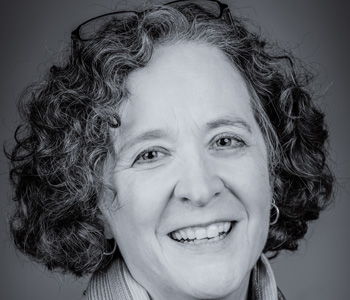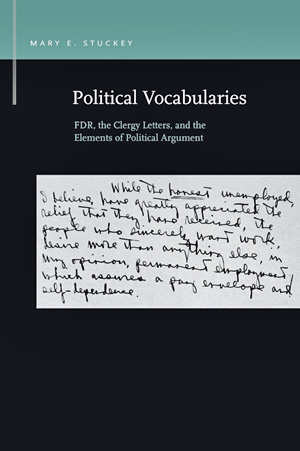
Political Vocabularies is about how Americans can agree on general political principles such as freedom and equality and at the same time disagree so vehemently about how to put those principles to work. We may experience the same political events, institutions, and people, but develop very different understandings of them. These differences are, at times, predictable and stable, but sometimes, especially during eras of political change, they can shift and transform. This happened in the 1930s, which is the period covered in the book, as the Roosevelt administration captured the allegiance of many of those who had been loyal Republicans and lost the allegiance of some who had been loyal Democrats. This New Deal coalition has been teetering for many years and may now be in the process of crumbling. I argue that by looking at the ways people created their political realities then, we can better understand not only that era but also our own.
I argue that these political realities are composed of five elements: First, they involve rhetorical authority. Each political reality locates political authority in different places: one part of the nation might want to see federal power strengthened, while another might want to see more power given to the states. And so political authority is very much a site of dispute between differing political vocabularies at any moment in time. Second, opposing political vocabularies are grounded in opposing characterizations of the specific political moment, its central issues, and its citizens, for we cannot imagine a political community without populating it and giving it purpose. Third, these issues and people are hierarchically ordered, which provides each reality with a sense of internal cohesion and which is also a central point of disputation between competing realities in a specific epoch. Fourth, each vocabulary is grounded in political tradition, read through our national myths which authorize the visions of national identity and purpose. Finally, each political vocabulary contains significant deliberative aspects, for each vision of the nation impels distinct policy imperatives. They are, in fact, our political priorities in action.
In the book, I tease out the ways in which the supporters and the opponents of FDR understood the nation, using a set of letters written to the president in 1935-1936.
The book looks at how people form the different political worlds in which they live. Perhaps we agree, in a broad sense, on what it means to be an “American.” But we have very different interpretations of what that means when it comes to acting on those principles and making political decisions. For example, we might all agree that “equality” is central to American political culture. But some of us argue that this dedication to equality means we must support social welfare programs while others just as sincerely maintain that it means we should eliminate those programs. This book examines how it is possible for people, who are dedicated to the same values and who look at the same political phenomena, can have such different understandings of the action that should be taken by the nation.
I have long been interested in US politics, and in how we craft a collective sense of ourselves as a nation and as citizens; I’ve published several books on related topics. I’ve also done a fair amount of work on Roosevelt; so combining those two things seemed very natural. I encountered the letters I use as the texts for this book while I was doing work on another project, and the letters themselves are just captivating to read. I kept going back to them, and finally admitted I had to write a book that used them.
I hope that readers who come across the book come to realize that people who disagree with them politically aren’t necessarily “wrong.” They just have a very different understanding of how the political world operates. They start with very different assumptions. Therefore, it makes more sense to talk about those assumptions instead of arguing about policy. The two things are logically connected, and the assumptions come first.
I also hope that readers come to read some of the quotations from the letters themselves. The letters were written in response to a request from the president that the members of the American clergy inform him of conditions in their communities. The clergy who replied took this task very seriously, and they give us a wonderfully complex view of life in the middle of the Depression. They are smart, and funny, and angry, and sad, and terribly moving; they are also very American.
The clergy, for example, argued both for and against the expansion of presidential power under Roosevelt. One individual noted, “I have never seen such evidence of a quick degeneracy and ruin as I have witnessed since you became the misleader of our nation,” while others considered Roosevelt to be “the most beloved of any president for years.” They disagreed on policy too: Some told moving stories of the plight of the deserving poor, whose lives had been wrecked by the Depression, and others wrote of their contempt for those who took government money and refused to work. These letters are evidence that the debates motivating politics in the 1930s are, in many ways, with us still.
Members of the clergy were both members of an elite and also very closely connected with local communities. Some were relatively prosperous, while others were struggling, so they had a unique set of perspectives on the political changes and challenges associated with the New Deal. And those perspectives add to our understanding of that important moment in time.
We live in different political worlds, constructed through rhetoric. Our understandings of the kinds of authority that are appropriate for a democracy differ. Our understandings of the kinds of people who make good citizens and the hierarchies among those citizens differ. How we justify our beliefs, and, as a result, which policies we prefer, differs. This book, which examines those differences in the 1930s, helps us better understand our own times. We can’t begin to solve the problems associated with political polarization until we have understood its roots. I hope that this book contributes to that endeavor.


Mary E. Stuckey specializes in political and presidential rhetoric, political communication, and American Indian politics. She is the author, editor, or co-editor of twelve books and author or coauthor of roughly 80 essays and book chapters. She has received the NCA Distinguished Scholar Award, the Michael M. Osborn Teacher/Scholar Award, the Rose B. Johnson Award (with Zoe Hess-Carney), the Roderick P. Hart Outstanding Book Award, the Marie Hochmuth Nichols Award, and the inaugural Carl Couch Center Bruce E. Gronbeck Political Communication Award. She has served as editor of the Southern Communication Journal and as book review editor for Rhetoric and Public Affairs. She is Editor-elect of the Quarterly Journal of Speech. She currently co-edits (with Mitchell McKinney) Peter Lang’s series, The Frontiers of Political Communication. She received the John Sisco Teaching Award from the Southern States Communication Association, the Pi Sigma Alpha Teaching Award from the American Political Science Association, and the Elsie M. Hood Teaching Award from the University of Mississippi. Her current book project is on the rhetoric of political change.